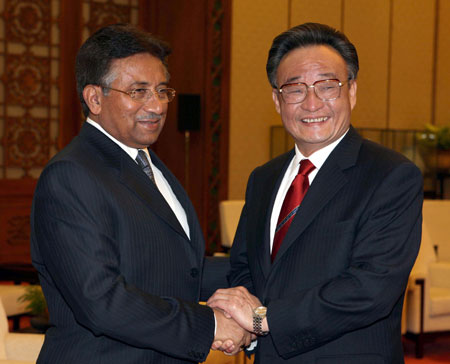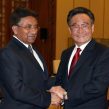
Sino-Pakistani Defense Relations and the War on Terrorism
Publication: Terrorism Monitor Volume: 6 Issue: 8
By:

Concurrent with Pakistan’s often tumultuous military relationship with the United States is a growing and highly amicable economic and military relationship with China that poses vital questions regarding Pakistan’s future approach to the War on Terrorism. While suspicion of American motives runs high in Pakistan, China has made major inroads in the South Asian country, including a free-trade deal, assistance in power development, the implementation of a five-year trade and development plan and a strategic partnership meant to address deficiencies in Pakistan’s military technology and increase cooperation against Islamist terrorist cells (Xinhua, April 3; Associated Press of Pakistan [APP], April 17).
Discussions on defense and security issues were an important part of this week’s state visit to China by Pakistani President Pervez Musharraf (APP, April 14). Pakistan and China are involved in major co-production projects involving the manufacture of JF-17 Thunder fighter aircraft—similar to American F-16s, which Pakistan continues to purchase from the United States—and F22P naval frigates. The latter project involves the construction of four frigates, three in China and the last in the Karachi shipyards. The project involves important technology transfers—unavailable from the United States—that will allow Pakistan to build major warships on its own (Dawn [Karachi], April 5; China Daily, April 5).
Changes Brought by the War on Terrorism
Beijing has major stakes in the war against terrorism. It has clearly enunciated that Pakistan is as central to its national security interests as Israel is to Washington. In strategic terms, the infusion of a U.S. military presence into Central Asia, Pakistan and Afghanistan has seriously upset China’s security calculus on which its Western strategy is predicated (see China Brief, February 28, 2002). China also worries about the possible expansion of a U.S. military presence closer to China’s doorstep [1].
While U.S.-Pakistani defense ties date back to 1954, Pakistan and China have had strategic ties since the 1962 Sino-Indian conflict, in which the United States rushed to support India. These relations crystallized after Pakistan’s disillusionment with the United States for its lack of support during the 1965 Indo-Pakistan war. Since then, Pakistan’s relationship with the United States has seen several ups and downs while its ties with China have been steady, consistent and expanding. China has been Pakistan’s largest defense supplier with Beijing viewing Pakistan as a useful counterweight to Indian power and influence in the region [2].
Two major consequences of the U.S.-led War on Terrorism have been the positioning of sizeable U.S. military forces in proximity to China’s southwestern frontier and the involvement of Pakistan, China’s time-tested South Asian ally. These developments served to not only checkmate the spread of Chinese influence and precipitate a rollback of Chinese efforts at strategic expansion in the region but also tilted the regional balance of power decisively in Washington’s favor virtually overnight [3].
Near airbases that were used by the U.S. Air Force until 2004-2005, China is now the major force behind the construction of a major civil/naval port at Gwadar, along the coast of Balochistan province. China’s navy will have full use of the port once finished and a rail line, a fiber-optic line and a petroleum pipeline will run from Gwadar to the Karakoram highway that connects to China (APP, April 12).
These developments are taking place in an environment that sees China’s relations with the United States as somewhat unstable, but relatively positive at the moment. Both countries want success in the war against terrorism but have different policies and interests in some areas, such as the war in Iraq and China’s call for Taiwan reunification.
In the wake of the global wave of horror that swept the world after 9/11, both China and Pakistan expressed their support for the United States differently and with varying motives and reasons. While China needed time to formulate its policy afresh, Pakistan probably had no way out but to acquiesce and join the U.S. bandwagon, though this has not been without benefit to Islamabad. There is no denying the fact that the presence of U.S. forces on Pakistani soil contributed to the de-escalation of the 2002 Indo-Pak military stand-off and generated strategic dividends for Pakistan.
New Government, New Policy
While the War on Terrorism continues unabated, recent internal developments in Pakistan have raised fresh questions regarding Pakistan’s continuing support for this war. With the pro-Musharraf forces having been routed, the new democratically elected government is bound to have a fresh look at its foreign policy, especially in the context of its relations with both the United States and China.
Interestingly, Pakistan’s unstinting support of the War of Terrorism does not seem to have impinged negatively on its relationship with China. In fact, Pakistan and China have been cooperating in parallel on their own counter-terrorism efforts. In this context, the moves of the Pakistani government in recent years to clamp down on Uighur settlements and on religious schools used as training grounds for militant Islam¬ists are relevant, as is the Red Mosque incident (Daily Times [Lahore], June 26, 2006). When tensions over Islamic extremism developed between China and Pakistan after Islamic vigilantes kidnapped several Chinese citizens, Musharraf responded quickly and very strongly (People’s Daily Online, October 12, 2004; Pakistan Times, October 14, 2004). Many believe that his decision to use military force against the extremists at the Red Mosque in Islamabad stemmed largely from the incident with the Chinese citizens, which had greatly embarrassed his regime. In his visit to China, President Musharraf declared that Pakistan would extend its full support to China in its battle against “East Turkistan” (Uighur) terrorists (Pakistan Times, April 9).
Pakistan has in the past been very helpful to China in controlling the separatist Uighur movement in Xinjiang. Not only did the Pakistan military kill Hasan Mahsum—the leader of the East Turkestan Islamic Movement (ETIM)—in October 2003, but in August 2004, Pakistani and Chinese armies conducted a joint anti-terrorism exercise in the province (China Daily, December 24, 2003). The conduct of this military exercise clearly indicated the Pakistani government’s acceptance of China’s desire to stamp out separatism in Xinjiang—even though the Uighurs are generally fellow Muslims—and its apparent agreement with China’s declarations that the separatists are Islamist terrorists in league with al-Qaeda.
Directions for the China/Pakistan Security Relationship
A visualization of the future brings three vital questions to the fore: Would Pakistan’s new government move away from its support for the War on Terror and tilt toward China? Could the Pakistani armed forces expect to get the desired military weapons and equipment from China that they can obtain from the United States? What role will the Pakistan Army’s leadership and the Inter-Services Intelligence (ISI) play during this policy review?
• Firstly, even though the newly elected government has been described by most as “secular” and “liberal,” it is going to find it difficult to distance itself from Islam because of the underlying strength of religious feeling among the masses and the widespread anti-American sentiment that prevails. On the other hand, its economic woes and security predicaments preclude it from distancing itself from the sole super-power. As such, the new government will likely adopt a middle-of-the-road path designed to keep both the Americans and the masses appeased. Walking this tightrope is not going to be easy, however, and will require skillful manipulation. On the external front, Pakistan trusts China much more than it does the United States, as Islamabad perceives Washington to have left it in the lurch once too often while China has been steadfast in its commitments. Once again, however, the imperative of staying in the U.S. camp will play a major role in the formulation of foreign policy but this will be done with the tacit approval of the Chinese, whom no Pakistani government can afford to alienate even in the slightest.
• Secondly, notwithstanding the enormous economic strides that China is making, its military weapons technology is nowhere near what the United States and the West are able to field. Since a budget-constrained Pakistan is limited in what it can afford to purchase, the best option for it would be to procure limited amounts of quality equipment from the United States and the West with the quantity factor being made up by purchasing cheaper, although less modern, Chinese weaponry in greater numbers. As with the foreign policy option discussed earlier, Pakistan’s defense procurement is also expected to be two-pronged without either the United States or China being relegated in importance.
• Thirdly, much is being said about the role of the Pakistani military in the future foreign and defense policies of Pakistan, with some analysts conjecturing that the Pakistan Army is likely to be split into pro-United States and pro-China camps. This possibility appears farfetched because of a multitude of reasons: Firstly, since Pakistani-U.S. military ties date back several decades, most of the senior leadership have all been trained in the United States and have a soft spot for the West; secondly, a very limited number of Pakistani military personnel have been trained in China and most of these are still at the middle leadership level; thirdly, with the election of the new government, it can be expected that legislation would be put in place to obviate the chances of the military assuming power again in Pakistan; and fourthly, the fact that most soldiers, airmen and sailors realize that even the best weapons that China can provide do not technologically compare with what can be obtained from the United States and the West.
While there is no doubt that Pakistan’s relations with both China and the United States are at critical junctures and any change in either is bound to impact the other, an objective analysis of the prevailing situation and the realities on the ground leads one to the following conclusions:
• Pakistan’s new democratically elected government will continue to support the United States in the War on Terror. It will simultaneously strive to ensure that the Uighur separatists from Xinjiang are neither afforded any help nor safe havens on Pakistani soil.
• Pakistan will adopt a middle-of-the-road foreign policy aimed at accommodating the needs and requirements of both China and the United States. Under the present circumstances, Pakistan cannot afford to distance itself from either.
• Since financial constraints dictate that Pakistan resort to a suitable quality-quantity mix in its military weapons, it will continue to rely on the United States for quality while depending on China for quantity.
• With the foundations of democratic order having been laid in Pakistan, one could surmise that the role of the military in affairs of state would gradually reduce. As regards the ISI, since it is a military-operated institution, one might expect its role on the international scene to be reduced correspondingly with an increased element of civilian control over its activities.
Notes
1. Jing-dong Yuan, “The War on Terrorism: China’s Opportunities and Dilemmas,” Center for Non-Proliferation Studies, Monterey Institute of International Studies, September 25, 2001.
2. Lisa Curtis, “Security Challenges Involving Pakistan and Policy Implications for the Department of Defense.” Testimony delivered before the Armed Services Committee, U.S. House of Representatives on October 10, 2007.
3. Mohan Malik, “Dragon on Terrorism: China’s Tactical Gains and Strategic Losses Post September-11,” Strategic Studies Institute, U.S. Army War College, Carlisle, PA, October 2002.




